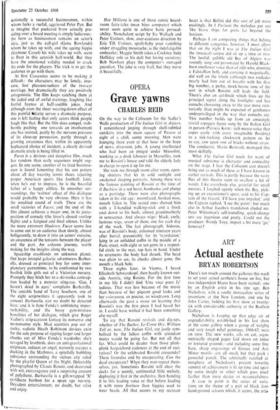Grave yawns
OPERA CHARLES REID
On the way to the Coliseum for the Sadler's Wells production of The Italian Girl in Algiers, I remembered jeeping through shell-rubbled outskirts into the main square of Pesaro at eight of a chill, sunny morning. Men were lounging there even at that hour in the hope of news, diversion, jobs. A young intellectual who had been an émigré under Mussolini, working as a dock labourer in Marseilles, took me to Rossini's house and told the elderly lady in charge to open it up for me.
She took me through room after room, open- ing shutters that let in cold sunlight and awakened sleeping portraits. Among these was the famous painting of Rossini at the time of 11 Barbiere in a red beret, handsome and plump as a partridge. There were also photographs taken in his old age: moonfaced, hooked nose, mouth fallen in. The seated ones showed him with a T-handled walking-stick and a frock coat down to his heels, almost grandmotherly in senescence. And always wigs: black, curly, lustrous wigs, seven of them, one for each day of the week. The last photograph, hideous, was of Rossini's body, exhumed nineteen years after burial, presumably for its 'translation,' lying in an unlidded coffin in the middle of a Paris street, with eight or ten gents in a respect- ful circle to the rear, top hats in hand. Under its cerements the body had shrunk. The head was plain to see, its cheeks almost gone, the mouth a black hole.
Three nights later, in Vienna, I heard Elisabeth Schwarzkopf, then hardly known out- side Austria, sing Rosina. For the first time in my life I didn't find 'Una voce poco fa' tedious. That was less because of the music than because of her piquant good looks and her coloratura, so precise, so wiredrawn. Long afterwards she gave a nroue on learning that Rossini's was the first piece I had heard her in. I could have wished it had been something else myself. To say that Rossini revivals and dig-ups, whether of The Barber, Le Come Ory, William Tell or, now, The Italian Girl, are justly sym- bolised by the lidless coffin with attendant mutes would be going far. But not all that far. What could be deader than those plink- plonk harpsichord cadences at the end of reci- tatives? Or the celebrated Rossini crescendo? These formulae end by exasperating. Can the dead exasperate? When they over-repeat them- selves, yes. Sometimes Rossini will clear the decks for a seemly, sentimental little melody, deploying it first in the orchestra, then handing it to this leading voice or that before loading it with more fioriture than hippies used to wear beads. All that occurs to my recreant heart is that Bellini did this sort of job more excitingly. In 1 Puritani the melodies put out like brave ships for ports far beyond the horizon.
Perhaps I am comparing things that belong to different categories, however. I must allow that on the night 1 was at The Italian Girl the (musical) corpse did sit up a time or two. The lustful, gullible old Bey of Algiers was roundly sung and personated by Harold Black- burn (mellower voice than of old) who, donning a Falstaffian belly and carrying it majestically, did well on the whole (although two roulades nearly had him out of breath) with his first big number, a perky, mock-heroic tune of the sort in which Rossini still leads the field. There's also an act-finale which lines up the principal septet along the footlights and has eunuchs chorusing away to the rear more sten- torianly than might be expected of gentlemen underprivileged in the way that eunuchs are. This' number builds up from an amusingly trivial arpeggio figure sung by the Italian Girl in person (Patricia Kern: rich mezzo voice that copes easily with every imaginable floridity) to a tick-locking, clockwork pattern or, let us say, row upon row of bricks without straw. The conductor, Mario Bernardi, managed this most skilfully.
What The Italian Girl needs for want of musical substance is character and comicality on the stage. I fear the Coliseum cast doesn't bring out as much of these as I have known in earlier revivals. This is partly because the vasty flies of this theatre seem to swallow a lot of words. Like everybody else, grateful for small mercies, I laughed openly when the Bey, pick- ing up an executioner's spear, said to his Cap-
tain of the Guard, have you impaled,' and the Captain replied, 'I see the point'; but much else in Arthur Jacobs's translation eluded me. Peter Whiteman's self-trundling, quick-change sets are ingenious and pretty. Could not the producer, Wendy Toye, impart a bit more 'go,' however?














































 Previous page
Previous page